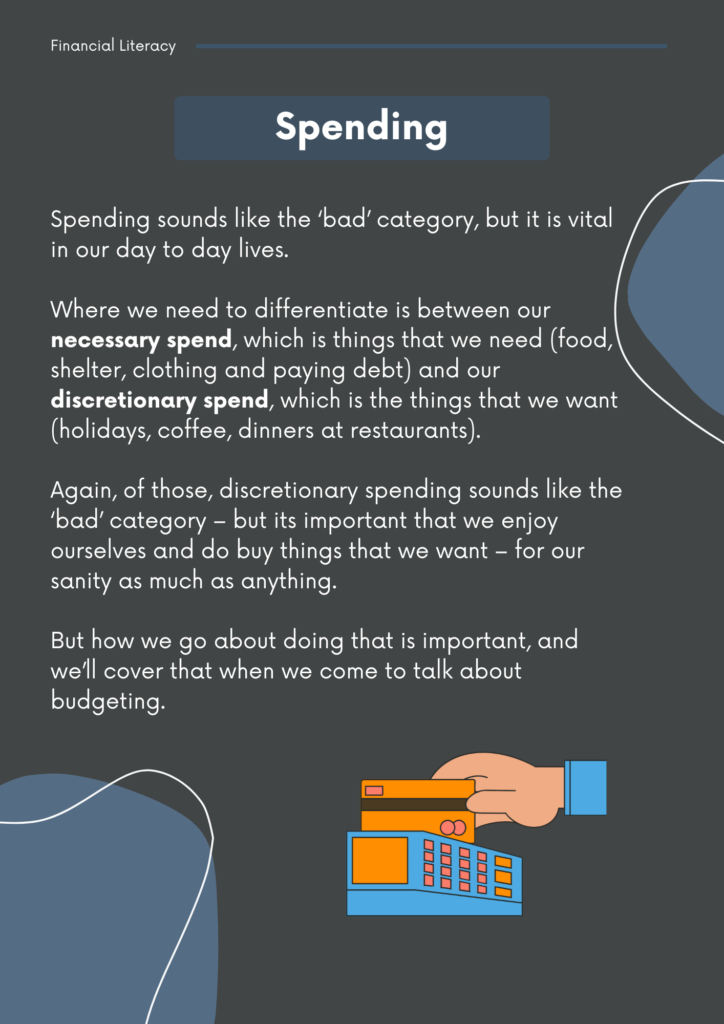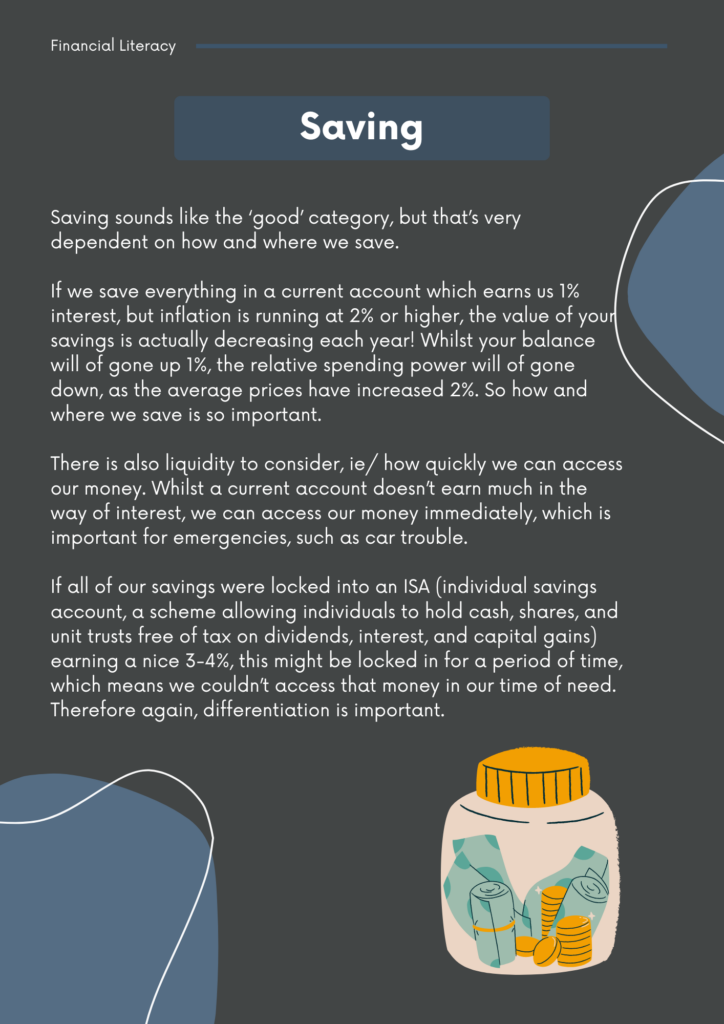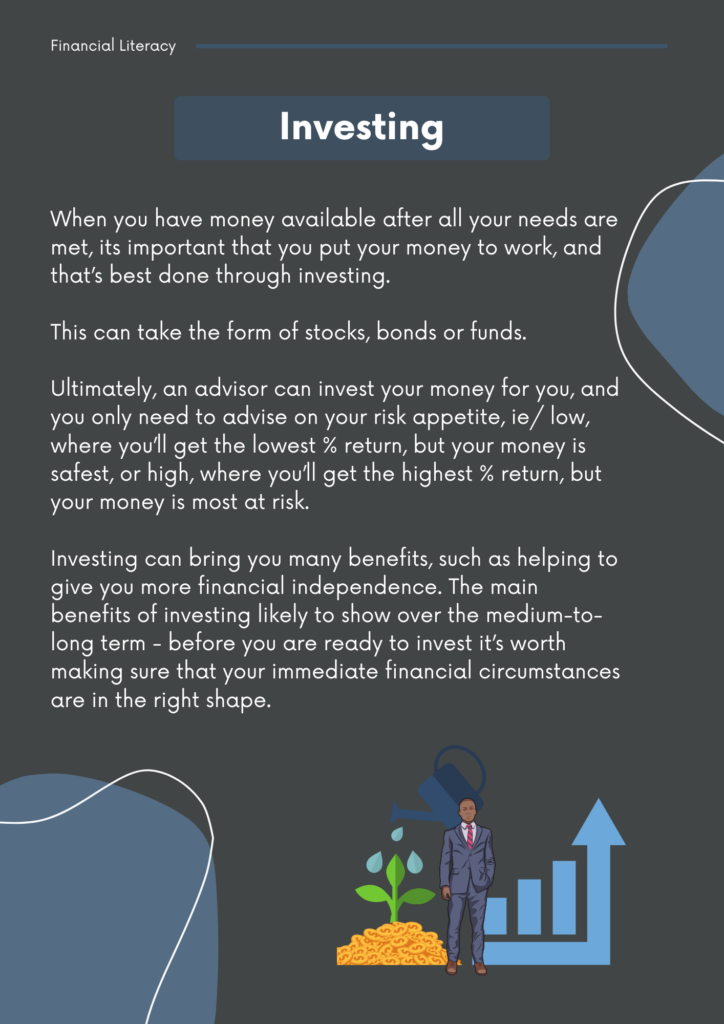Following on from recognising the importance of money in the last lesson, it is time to recognise the choices you have with your money. How to budget, spend and save and more will be covered.
So, let’s get into it.
What can you do with your money?
There are broadly three different options with what you can do with your money; Spend it, Save it, or Invest it.
All of these areas are important – but rarely is the balance right between the three! Most of us spend too much, save too little and invest not at all.
“Its not how much you make, but its how much you KEEP. That’s the key to a successful financial life.”
Multiple contributors



TASK
Put the items below into the appropriate spend category, write this in your own notes: 1) Essential or 2) Discretionary…
Task One – Check your spend category knowledge
Put the items below into the appropriate spend category, write this in your own notes: 1) Essential or 2) Discretionary…
- Weekly food shop
- Birthday presents
- Petrol
- Coffee
- Restaurants
- Cinema
- Takeaways
- Cigarettes
- Heating
- Gym membership
- New trainers
- Rent
- Insurance
- Holiday flights
- Medical bills
How did you find that exercise? Click to reveal some further guidance.
- This requires judgement, and there is no right or wrong answer. Gym memberships for example would largely be considered a discretionary, non-essential spend, but if you felt that it was key to your health, then you could argue it was a necessity.
- Discretionary spend is not evil! Discretionary spend is important for our quality of life and sanity. Coffee is a 100% discretionary spend – but most of the working world relies on it daily!
How to budget
“Telling your money where to go; instead of wondering where it went”
Budgeting is keeping track of your income and expenses, so you know where your money is going each month. There is significantly more data available from banks around transactions now than ever before.
A good budget will; let you live within your means, get out of debt, have a cushion for unexpected expenses, save for bigger things and ultimately, plan for the future. They can be done with pen and paper, on a spreadsheet or on one of the multitude of apps available (‘Emma’, ‘HyperJar’, ‘Monzo’ ‘Yolt’) but however they are done, the fundamentals are the same.
Download our budgeting cheat sheet here:
Glossary of key terms
- Income – Money in
- Expenses – Money out
- Asset – Resource that will bring future economic benefit
- Liability – Obligation to transfer economic benefit
- Stocks – Units issued by a corporation that represent ownership
- Funds – Type of investment and collection of resources
- Bonds – Issues by governments and corporations to raise money
- Principal – Initial amount invested or borrowed
- Interest – Monetary share for borrowing money
- Credit score – Represents ability of a person to fulfil their commitments
Budgeting fundamentals
Task – Problem solving a real-scenario
Rupert has started to monitor his monthly expenditure, but as yet has never managed to cut back sufficiently to avoid spending everything he earns.
Rupert is 21 and has been working in a pub for 18 months. He is happy in his job and how much he earns for now, but is struggling to save any income. He wants to start saving so has been tracking his expenditure.
His travel expenses are mostly from work, and some of his favourite things to do each month are nights out with friends or takeaways at home.
He knows there are things he could cut back on but is not sure where to start.
Based upon what you have read about Rupert above, see if you can adjust his expenditure such that he has some money left at the end of each month. How much could he save each month? How much would this add up to in the next 6 months?
Complete this table in your own notes and then consider adapting it for your own income and outgoings, to start your own budget.
| Net income | Amount | Expenditure | Amount | Adjusted |
| Work | £1,235 | Rent | £410 | |
| Food | £255 | |||
| Utilities | £72 | |||
| Mobile phone | £38 | |||
| Takeaways | £75 | |||
| Vape | £30 | |||
| Clothes | £65 | |||
| Nights out & alcohol | £150 | |||
| Travel | £140 | |||
| Total | £1,235 | £1,235 |
Managing a transition
Going to university, moving house, renting with friends, entering the workforce, changing jobs or buying a property are all significant life events and financial events. Or perhaps later in life, getting married, divorced or having children are all significant events.
Moving out from your parents’ house generally involves an initial outlay of money. There are the go forward costs (rent etc) which we should budget for, but there could also be significant one-off expenses, such as security deposits (as much as three months rent), furniture or decorating costs, which need specific planning for.
With regards to going to University specifically, did you know;
- Accommodation aside – the average student spends £247 per week? This skyrockets to £427 in freshers’ week alone (UCAS ‘Spend Student Lifestyle 2020’ Report).
- Three quarters of students who applied to a scholarship or bursary, were successful? (UCAS ‘Freshers Experience 2019’ Survey – January 2020). If you haven’t done so yet, explore these extra sources of funding (See link here or at bottom of page from UCAS)
Whether a move is to uni or somewhere else, there are options when moving out to prepare for the financial obligations which will be new, to help ease the financial burden;
- Location; One way to make your day-to-day life easier, while also saving money on transport, is to choose an area within a short a journey as possible from your workplace or place of study, or the places you go to most often. Walking or cycling where possible is a good way to fit physical activity into your day while also greatly reducing greenhouse gas emissions (thereby helping to protect the environment).
- Housesharing; If you can’t afford to live on your own, you can share a place with other people. It will save on expenses like rent and bills related to the household, as these are shared among the people living there. This can also be a good way to gradually learn how to manage your finances and prepare to go for it alone.
- DIY; You can save even more money by doing it yourself, whether that’s cooking at home more, buying ingredients and chopping and peeling them yourself, or fixing things around the house. At the end of these materials are some further money saving hacks which could be useful here!
Moving into your own place and becoming independent will enable you to develop the skills necessary to able to make your own decisions. Leaving the family home in a planned way will help you reach your goals and maintain good financial health in the present – and in the future.
